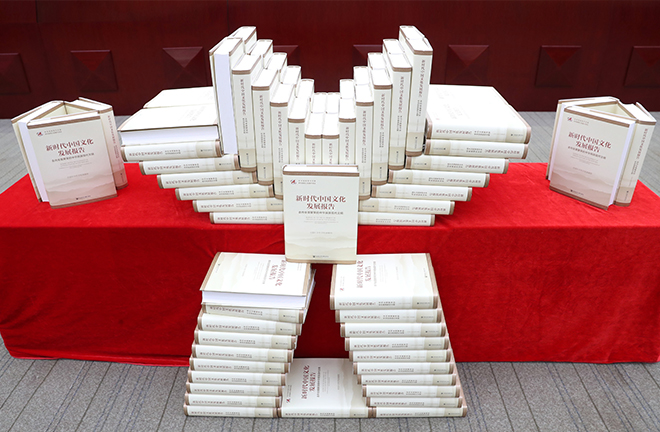CASS report sums up nation’s cultural development achievements

The Report on the Development of China’s Culture in the New Era: Towards a Fully Prosperous Modern Civilization of the Chinese Nation Photo: Zhu Gaolei/CSST
On Feb. 2, the Chinese Academy of Social Sciences (CASS) held a press conference in Beijing to unveil the Report on the Development of China’s Culture in the New Era: Towards a Fully Prosperous Modern Civilization of the Chinese Nation, a major outcome of the premier think tank’s initiative to research and interpret the modern Chinese civilization.
In his keynote speech at the conference, CASS Vice President Zhen Zhanmin noted that based on existing research achievements made by theorists of social sciences, the Report is innovative in several ways. It clarifies that Xi Jinping Thought on Culture is the flag and soul for prosperous cultural development in the new era, and integrating the basic tenets of Marxism with China’s specific realities and fine traditional culture is the inevitable path toward fostering a thriving Chinese culture and transforming Chinese civilization.
Moreover, the Report asserts that people-centeredness is the core principle of cultural development in the new era, digital culture is a salient feature and powerful driver of this undertaking, and civilizational exchanges and mutual learning is a new approach to constructing a new order for the world civilization, Zhen said.
According to Hu Bin, director of the Bureau of Scientific Research Management at CASS, the Report represents the first major research project implemented by CASS since the program on researching and interpreting the modern Chinese civilization was launched. Engaging over 80 experts and scholars from CASS and other research institutions, the project conducted cross-disciplinary and comprehensive studies, resulting in a substantial output comprising over 500,000 Chinese characters.
Luo Wendong, deputy director of the Institute of World History at CASS, elaborated on the historical background, original contributions, and great significance of Xi Jinping Thought on Culture, saying that the Thought has enriched and furthered Marxist cultural theory, particularly in terms of the compatibility between Marxism and fine traditional Chinese culture and the major exposition on shaping the cultural form of Chinese modernization.
As the latest instantiation of the integration of Marxist cultural theory with contemporary Chinese cultural construction practices, Xi Jinping Thought on Culture is of milestone significance in providing sound guidance over cultural construction practices in the new era, building a strong socialist culture and a modern Chinese civilization, and developing a new form of human advancement, Luo said.
“People’s cultural practice” is a new concept put forward in the Report. Ding Guoqi, director of CASS’s Institute of Ethnic Literature, explained that “people’s cultural practice” refers to the broad masses’ cultural creation, inheritance, and communication activities in everyday life on the basis of historical, traditional, and social experience. The concept originates from the core principle and value orientation of people-centeredness and is an important manifestation of the people-centered nature of Xi Jinping Thought on Culture.
Yang Dian, deputy director of the Institute of Sociology at CASS, offered an introduction to the survey on Chinese residents’ satisfaction with cultural development in 2023. The survey shows that Chinese people were generally very satisfied with current cultural development, expressing strong confidence. They reported a fondness of fine traditional Chinese culture and of culture upholding patriotism. Overall they preferred literary and artistic works grounded in Chinese culture, and agreed that Chinese culture and foreign cultures can be compatible.
New media had become the primary vehicle for cultural communication at present, and the construction of a digital cultural China had been brought to new heights, according to the survey. Respondents believed that public cultural services were relatively rich, and popular cultural activities were increasingly vigorous to meet individual needs along various dimensions.
Edited by CHEN MIRONG
